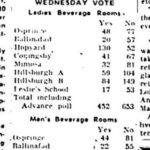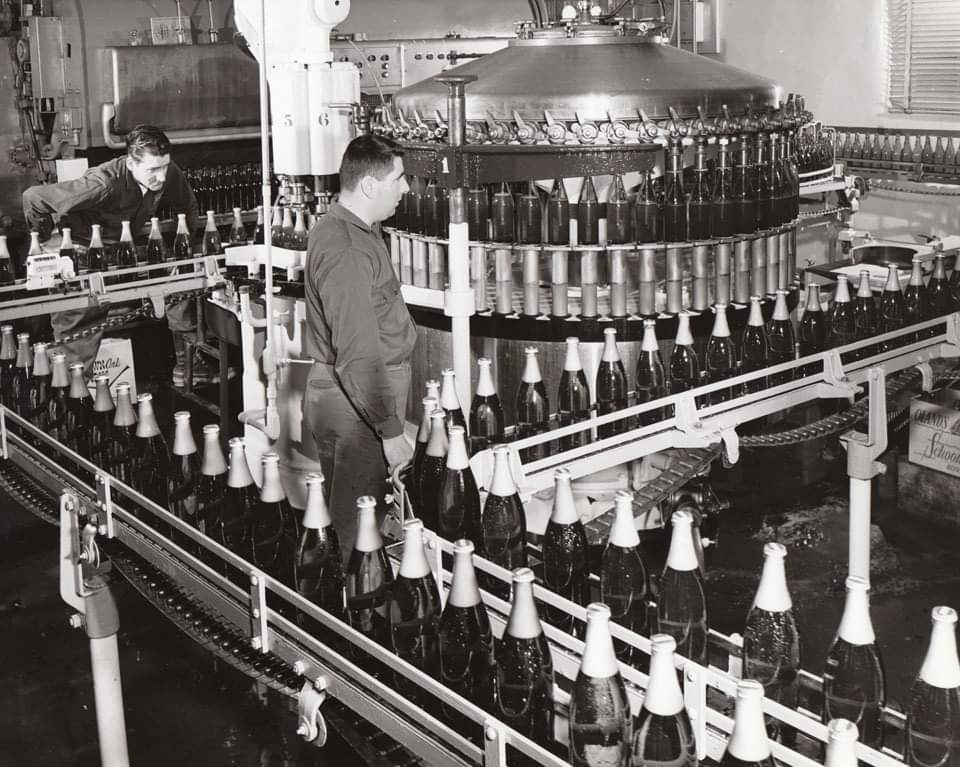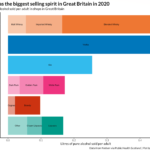Once in a while I get asked things by members of the professional media. It is flattering and instructive. The questions are usually specific but also open ended enough to allow for some back and forth and, as in this case, an opportunity to dig a bit more. This week I received this question from a rather large outlet to my east:
I’m trying to get information about one such former tavern: Montreal House, in Peterborough. I’m looking into Montreal House because yesterday Peterborough city council voted against giving it a heritage designation; this means the building will be demolished. The Montreal House was built for lumbermen from Quebec who came to work in the Peterborough… I was wondering if you knew about the Montreal House? And if you were knew how I could go about confirming if the tavern really was the last—or one of the last—men’s only establishments in the province?*
Those of you alive to the information era we live in will know that a year or so ago I reposted a bit of research I did for our book Ontario Beer on licensing in this here province after temperance and the phenomenon of the ladies only license that was introduced in 1934 as part of that. But I had not really considered the other side of the coin, the men’s only license.
Something seemed odd about the suggestion that this one tavern was the last one, sitting there in Peterborough, a mid-sized Ontario City known for its most excellently named minor hockey team, the Peterborough Petes. That something odd was that there was the idea that there would have been one the last one and not a bunch. Usually when a law like this changes, any number of permits would shift in terms of their application. So why did someone think there was just this one last straggler? I wanted to know what this was about. So I had a look where every clever beer writer starts looking. In databanks of court rulings.
One excellent resource describing these spaces popped up almost immediately, the 1953 Ontario Court of Appeal ruling in the case of Assaf v. The City of Toronto. It is excellent because it is a case of an expropriation which occurs when a government takes someone’s land for a government use and has to pay compensation including all legal fees, loss of business income, etc., etc. So there is a description of the thing being valued:
The lands expropriated are situate on Bay Street Street, in the city of Toronto, having a frontage of 35 feet 8 inches on the west side of Bay Street just north of Queen Street, by a depth of 82 feet 3 inches. Upon the land is erected a four- storey brick building, with fire-escape to the rear, and a full basement. It is well located where traffic, at least during the day, is very heavy. The building consists of a basement, the ground floor and second, third and fourth floors. In the basement are the heating apparatus, storerooms, refrigerator units and a beer-cooler. On the ground floor there is a lobby with a ladies’ beverage-room and a men’s beverage-room, with washrooms for both ladies’ and men’s beverage-rooms. On the second floor there are two dining- rooms, with a lunch-counter, and also a fully-equipped kitchen, two washrooms and a counter. On the third floor there are ten bedrooms, nine equipped with sinks with hot and cold running water, one bathroom and a separate toilet. On the fourth floor there are ten bedrooms, eight equipped with sinks with hot and cold running water, one bathroom and a separate toilet.**
Those in the know may have caught this before I did but it looks like those lands were among those expropriated for the building of Toronto’s New City Hall. Based on the 1913 map of the area, a bit of which is displayed above, it looks like the place was called the Cadillac Hotel before the first world war and Canada’s brief and leaky era of temperance. It sat right under what is now the south-east corner of the outdoor skating rink in Nathan Phillips Square which has been used, pursuant to Federal regulations, as a location in every Canadian film since 1964.*** And notice what was in the place after it got its 1940’s renovations discussed in the case: separated ladies’ and men’s beverage-rooms off a ground floor lobby with washrooms for each.
What sort of thing went on in these spaces? If we rely on Court cases, we learn of the bad things. For example, in an appeal from the judgment of the County Court of the County of York, dated June 18, 1939, the Court of Appeal of Ontario found itself involved in the case of a bar room brawl in one ladies beverage room:
Riley was working in the tap room when a “rumpus” occurred in the ladies’ beverage room. Riley encountered Lloyd in the lobby, where he inquired as to the cause of the rumpus. Lloyd said he couldn’t seem to do much about it and, according to Riley, turned the matter over to him. Riley entered the ladies’ beverage room, to find Stephenson in a bellicose mood with his feet on a chair, and when he ordered him to remove his feet, a fight resulted, in which, according to Riley, Stephenson struck the first blow. It was admitted that no express instructions were given to Riley, either by Finnegan or Lloyd, to strike Stephenson, and that the general instructions to the waiters were to handle customers peacefully.
Notice: neither Riley or Stephenson were ladies. In the 1945 trial decision in a case brought by one Mr. Gardner, a customer, against Mr. McConnell, the manager, we get a bit more detail on another fight:
The plaintiff is a cook who had been employed in that capacity at the Leonard Hotel… He was a married man and had been accustomed to patronize the beverage room of the defendant together with his wife and their friends. He joined his wife and her friend at a table near the taproom, having entered the beverage room through the lobby of the hotel. The beverage room also had a direct entrance or exit, as the case might be, from it to St. Paul St. at the opposite end of the room from the tap-room. The tap-room was presided over by the husband of the defendant McConnell, who was the manager of the hotel and of the beverage room. The beverage room in question was the one known as the ladies’ beverage room, and had as waiters in it two men—one Jefferson and one Meighan.
Again, there were plenty of men in this space including one called Bloomer who looking for a fight and found a few including with the staff as the judge discussed:
I accept Gardner’s evidence that he was treading his way with caution to avoid becoming mixed up with any trouble which was occurring between others in the beverage room, and was proceeding to the door when he, as he puts it, was “crashed into” by a man in a white coat, ostensibly a waiter and who, Ι accept on the evidence, was the waiter Meighan who had been struck by Bloomer. The result was that Meighan was knocked to the floor with Bloomer on top of him, still assaulting him.
Fantastic! And still… all these men. Hmm… the same thing happens in 1955 when we read about a…
… young man in question [who] along with two or three companions strolled into the beverage room, ordered a bottle of beer from the waiter, was supplied same, drank it and then wandered into the ladies beverage room, sat there chatting for five minutes or so, when the manager of the tavern, accompanied by an inspector or police officer, came in and challenged the boy as to his age.
These sorts of things go on in rulings from 1960, 1965, 1969 and 1971 – one of which even makes it to the Supreme Court of Canada. In that last ruling from 1971, we have a rather vivid description of a session at one of these places:
Lorenzo Beauchamp and Massicotte joined Florence Dallaire at her table in the ladies’ beverage room. She thought that her brother was “feeling good” and that he talked in a strange way but that he walked all right. An argument developed and Mrs. Dallaire slammed her glass on the table and left. Although Massicotte and the deceased had not quite finished their one draught of beer they proceeded to leave the ladies’ room by the staircase, where the deceased suffered his fatal fall. His condition immediately before leaving the ladies’ beverage room therefore becomes critical; Vincent McAlendin, who was the waiter on duty in that room, thought that the deceased’s condition was good, and that there was no reason to refuse to serve him beer. He was not stumbling or wobbling on his way out. This evidence is confirmed by Charles Fasciano who had heard the loud talk at the Beauchamp table but observed that the deceased’s manner of walking was not impaired on his exit.****
OK – now we have some ladies and they are perhaps of the harder variety… glass slammers. Otherwise, you see this sort of thing like here in the lead up to a 1961 case of murder after a bar closed:
…the only evidence as to the amount of beer consumed by the appellant during the evening of 9th June, apart from that contained in his statement, was given by his companions Zackariah and Baker. Zackariah said that the party of four (the appellant, his wife, Baker and Zackariah) went into the ladies’ beverage room of the Wembley Hotel about 8:30 p.m. Mrs. Fisher “had a coke” and “we had a few beers and then we went down to the Men’s Room,” after Mrs. Fisher left the party about 9:20 p.m. They had “some beer” in the men’s beverage room, and the appellant left Zackariah and Baker “to see some friends.” He returned about three-quarters of an hour later and “had a beer with us… He finished his beer and part of another one.” Later he said in examination-in-chief “That makes three he had down there,” that is, in the men’s beverage room.
So the calculation seems to be this: drinking men include ba d men therefore men need to have their own space to be drunker or nastier than the space where the ladies gather or where folk mix. That is why one category of license was called the men’s beverage room in Ontario’s regulations.***** That seems to be the thing to take from these rulings. The ladies beverage room license was actually “ladies and escorts” as the signs read, like the one at the Douglas Tavern that I mentioned in Ontario Beer which is now closed and converted as of June 2021. But any escort in theory was present on the consent of the ladies as I understand it, given that women could also be there alone or with other women. Those escorts were supposed to be a spouse or a date. Yet one report of a 5:1 men to woman ratio was witnessed at the ladies beverage room of the Tusco Hotel in Toronto in 1936. When three government inspector asked the bartender why he was serving unaccompanied men in the ladies beverage room, the bartender said that he didn’t want trouble. There were clearly picking uppings going on. The manager of the swanky Royal York pointed out another benefit: it “tends to increase the tone of business” if men are not left to drink alone. ****** Drinking men include bad men.
d men therefore men need to have their own space to be drunker or nastier than the space where the ladies gather or where folk mix. That is why one category of license was called the men’s beverage room in Ontario’s regulations.***** That seems to be the thing to take from these rulings. The ladies beverage room license was actually “ladies and escorts” as the signs read, like the one at the Douglas Tavern that I mentioned in Ontario Beer which is now closed and converted as of June 2021. But any escort in theory was present on the consent of the ladies as I understand it, given that women could also be there alone or with other women. Those escorts were supposed to be a spouse or a date. Yet one report of a 5:1 men to woman ratio was witnessed at the ladies beverage room of the Tusco Hotel in Toronto in 1936. When three government inspector asked the bartender why he was serving unaccompanied men in the ladies beverage room, the bartender said that he didn’t want trouble. There were clearly picking uppings going on. The manager of the swanky Royal York pointed out another benefit: it “tends to increase the tone of business” if men are not left to drink alone. ****** Drinking men include bad men.
 And it is important to appreciate that the same establishment could have multiple licenses then. We see that also in the rulings. Have a look at this report in the Georgetown Herald newspaper from February 1, 1962. At that point, municipal governments had to poll residents to see if they wanted any of the licenses in their community. Here the good people of Erin Township to Toronto’s northwest said no, no and no to each of three classes: ladies beverage room licenses, men’s beverage room licenses and dining room licenses. And in fact notice that the ladies beverage room polling got a higher “yes” turnout that the other two. The voting public didn’t want booze but it really didn’t want men only boozers. With good reason. The painter William Ronald discussed the problem in an interview in 1963:
And it is important to appreciate that the same establishment could have multiple licenses then. We see that also in the rulings. Have a look at this report in the Georgetown Herald newspaper from February 1, 1962. At that point, municipal governments had to poll residents to see if they wanted any of the licenses in their community. Here the good people of Erin Township to Toronto’s northwest said no, no and no to each of three classes: ladies beverage room licenses, men’s beverage room licenses and dining room licenses. And in fact notice that the ladies beverage room polling got a higher “yes” turnout that the other two. The voting public didn’t want booze but it really didn’t want men only boozers. With good reason. The painter William Ronald discussed the problem in an interview in 1963:
We didn’t even have any night clubs in Toronto until eight or nine years ago. And I don’t drink. This is perhaps why. Everybody asks me why I don’t drink. I don’t really know why. I had an uncle that died of alcoholism at the age of thirty-two. I was very fond of him. My mother’s brother. But really what I think it is now – when I was up in Canada on a recent visit – you see, they have what they call beverage rooms up there, men’s beverage rooms and ladies’ beverage rooms… And they’re horrible. They’re like washrooms with beer, you know. And if you’re not with a lady then you have to go to the men’s beverage room, and it’s not so nice. But if you’re with a lady you can go to the women’s, which is a little poshier. Then they used to have – maybe still have – a twelve o’clock curfew. And so at twelve o’clock everybody loads up and drinks, you see. And so the whole idea of drinking in Canada is to get drunk. I had never seen people drink the way they drink in New York. *******
That puts it in pretty clear perspective. The reason why you needed ladies beverage rooms was to create the other space, the men’s beverage rooms. Because men drank like pigs. Drank to get drunk. To fight. Which was also the problem they were dealing with at the outset of Ontario’s temperance regulations in 1877: men left alone will drink like pigs. Which means every bar now is really a ladies beverage room and, really, it means that the temperance movement won. Thanks ladies.
The references to these sorts of places fade away in the law books in the early 1970s. Reforms came in then that lowered the drinking age, loosened up where you could drink – and also drink in nicer lounges without buying food. Ontario was growing up. Was the Peterborough question answered? No. That may be for another day. Or a pro writer like the one who asked me the question. Let’s see what he finds.
*If the story goes live, you will be the first to know who wrote me.
**There is also an excellent exploration of the “gallonage” of the place – the amount of beer sold, calculated in utterly generic and bulk form. See in the headnote: “There should be some compensation for the difference in gallonage between our hotel and any similar hotel within a radius of 500 feet; the evidence shows that our business in the 12 months immediately before the expropriation was 69,526 gallons, while the gallonage in the 12 months before our purchase was only 25,706…”
***Utter lie.
****See also the 1965 ruling the case of Stephens v. Corcoran et al., 1965 CanLII 210 (ON SC), with this great detail on the spaces within these drinking establishments: “He went to the hotel for the purpose of consuming beer, and in the evening he planned to take his wife and two daughters to the policemen’s games which were to be held at the University of Toronto stadium. Having parked his car at the west side of the hotel, he entered the more southerly of the two entrances to the beverage rooms, the entrance being marked by a “1” in a circle on ex. 1 which is a floor plan of the ground floor. He proceeded to the point numbered “2” where he joined some friends, and consumed in all three pint bottles of beer. He had partly consumed a fourth bottle when he and one or two friends decided to go into another beverage room at the north- west corner of the ground floor, where he took his place at a table at which there were already others sitting and singing, at the point numbered “3”. He brought his partly-consumed bottle of beer with him, and sat down. I find that he was only in the second beverage room a short time before the 6:30 closing hour arrived and the dispensing of beer was closed off in accordance with the law. The table at which he sat may well have been at a point “T” in the same room, which during the day was used as men’s beverage room only and not as a men’s and ladies’ beverage room. About 6:40 p.m. the plaintiff decided to leave. The singing had come to an end, and he said he was going home. He proceeded from the table through a door marked “6” on ex. 1, and then proceeded westerly along the hall, which was illuminated presumably by sunlight shining through a closed door at point No. 9. This was not only closed but apparently locked in some fashion, perhaps by a padlock as shown in the photograph which was taken on October 11, 1965. However, the lighting conditions, it was agreed, are comparable to those which existed on the date of the accident. The plaintiff passed the first door on the left shown on ex. 4. It was locked. When he came to the door “5” on ex. 4 and indicated by figure “8” on ex. 1, he opened it apparently and then fell down the stairs which led to the cellar.”
*****The terminology differed amongst the provinces. In Saskatchewan until 1972 the mens’ only space was a parlour but a mixed area was a beverage room.
******This is not made entirely clear in Craig Heron’s excellent book Booze where it is discussed at page 291. Many pages are given to the topic in Try to Control Yourself by Dan Malleck – including the tale of the Tusco Hotel at page 171 and the Royal York at page 172.
*******The first day of the interview being the date of my birth… the passage goes on: “Some people drink to get drunk here but most people drink just the way they take a cigarette, you know. And some people can drink a lot of liquor but I rarely see people walking along the street the way you do in those towns up there; and cities. And up there not too long ago, for instance, I saw a young man about twenty-two, well-dressed and so on, on a Friday or Saturday night – it’s the big night – and white shirt, I remember, and all this; and there he was on the sort of Fifth Avenue of Toronto completely plastered, stoned, as they say, out cold on the sidewalk, being sick, and his two friends trying to drag him into the car. And this was a very common sight. This is the way always I was brought up – this is the way drinking was.”
















